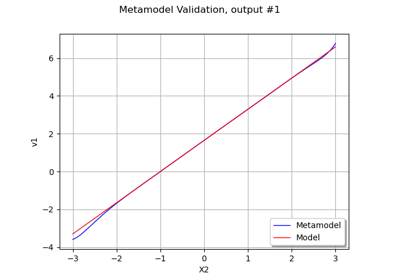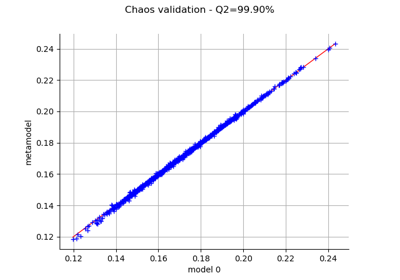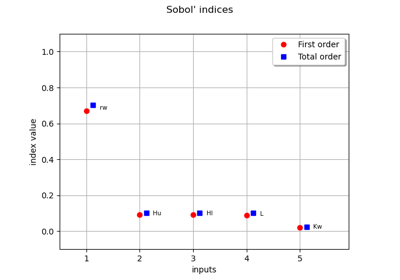FunctionalChaosSobolIndices¶
- class FunctionalChaosSobolIndices(*args)¶
Sensitivity analysis based on functional chaos expansion.
- Parameters:
- result
FunctionalChaosResult A functional chaos result resulting from a polynomial chaos decomposition.
- result
Notes
This structure is created from a FunctionalChaosResult in order to evaluate the Sobol indices associated to the polynomial chaos decomposition of the model. The SobolIndicesAlgorithm.DrawSobolIndices static method can be used to draw the indices.
Examples
Create a polynomial chaos for the Ishigami function:
>>> import openturns as ot >>> from math import pi >>> import openturns.viewer as otv
Create the function:
>>> ot.RandomGenerator.SetSeed(0) >>> formula = ['sin(X1) + 7. * sin(X2)^2 + 0.1 * X3^4 * sin(X1)'] >>> input_names = ['X1', 'X2', 'X3'] >>> g = ot.SymbolicFunction(input_names, formula)
Create the probabilistic model:
>>> distributionList = [ot.Uniform(-pi, pi)] * 3 >>> distribution = ot.ComposedDistribution(distributionList)
Create a training sample:
>>> N = 100 >>> inputTrain = distribution.getSample(N) >>> outputTrain = g(inputTrain)
Create the chaos:
>>> chaosalgo = ot.FunctionalChaosAlgorithm(inputTrain, outputTrain) >>> chaosalgo.run() >>> result = chaosalgo.getResult()
Print Sobol’ indices :
>>> chaosSI = ot.FunctionalChaosSobolIndices(result) >>> #print( chaosSI.summary() )
Get first order Sobol’ indices for X0:
>>> s0 = chaosSI.getSobolIndex(0)
Get total order Sobol’ indices for X0:
>>> st0 = chaosSI.getSobolTotalIndex(0)
Get first order Sobol’ indices for group [X0,X1]:
>>> stg01 = chaosSI.getSobolGroupedIndex([0,1])
Get total order Sobol’ indices for group [X1,X2]:
>>> stg12 = chaosSI.getSobolGroupedTotalIndex([1,2])
Methods
Accessor to the object's name.
Accessor to the functional chaos result.
getId()Accessor to the object's id.
getName()Accessor to the object's name.
Accessor to the object's shadowed id.
getSobolGroupedIndex(*args)Get the grouped Sobol first order indices.
getSobolGroupedTotalIndex(*args)Get the grouped Sobol total order indices.
getSobolIndex(*args)Get the Sobol indices.
getSobolTotalIndex(*args)Get the total Sobol indices.
Accessor to the object's visibility state.
hasName()Test if the object is named.
Test if the object has a distinguishable name.
setName(name)Accessor to the object's name.
setShadowedId(id)Accessor to the object's shadowed id.
setVisibility(visible)Accessor to the object's visibility state.
summary
- __init__(*args)¶
- getClassName()¶
Accessor to the object’s name.
- Returns:
- class_namestr
The object class name (object.__class__.__name__).
- getFunctionalChaosResult()¶
Accessor to the functional chaos result.
- Returns:
- functionalChaosResult
FunctionalChaosResult The functional chaos result resulting from a polynomial chaos decomposition.
- functionalChaosResult
- getId()¶
Accessor to the object’s id.
- Returns:
- idint
Internal unique identifier.
- getName()¶
Accessor to the object’s name.
- Returns:
- namestr
The name of the object.
- getShadowedId()¶
Accessor to the object’s shadowed id.
- Returns:
- idint
Internal unique identifier.
- getSobolGroupedIndex(*args)¶
Get the grouped Sobol first order indices.
- Parameters:
- iint or sequence of int,
Indice(s) of the variable(s) we want the associated grouped Sobol indices.
is the dimension of the input variables.
- marginalIndexint
Output marginal index. Default value is 0, i.e. the first output.
- iint or sequence of int,
- Returns:
- sfloat
The grouped Sobol first order index.
- getSobolGroupedTotalIndex(*args)¶
Get the grouped Sobol total order indices.
- Parameters:
- iint or sequence of int,
Indice(s) of the variable(s) we want the associated grouped Sobol indices.
is the dimension of the input variables.
- marginalIndexint
Output marginal index. Default value is 0, i.e. the first output.
- iint or sequence of int,
- Returns:
- sfloat
The grouped Sobol total order index.
- getSobolIndex(*args)¶
Get the Sobol indices.
- Parameters:
- iint or sequence of int,
Indice(s) of the variable(s) we want the associated Sobol indices.
is the dimension of the input variables.
- marginalIndexint
Output marginal index. Default value is 0, i.e. the first output.
- iint or sequence of int,
- Returns:
- sfloat
The first order Sobol index.
- getSobolTotalIndex(*args)¶
Get the total Sobol indices.
- Parameters:
- iint or sequence of int,
Indice(s) of the variable(s) we want the associated total Sobol indices.
is the dimension of the input variables.
- marginalIndexint
Output marginal index. Default value is 0, i.e. the first output.
- iint or sequence of int,
- Returns:
- sfloat
The total Sobol index.
- getVisibility()¶
Accessor to the object’s visibility state.
- Returns:
- visiblebool
Visibility flag.
- hasName()¶
Test if the object is named.
- Returns:
- hasNamebool
True if the name is not empty.
- hasVisibleName()¶
Test if the object has a distinguishable name.
- Returns:
- hasVisibleNamebool
True if the name is not empty and not the default one.
- setName(name)¶
Accessor to the object’s name.
- Parameters:
- namestr
The name of the object.
- setShadowedId(id)¶
Accessor to the object’s shadowed id.
- Parameters:
- idint
Internal unique identifier.
- setVisibility(visible)¶
Accessor to the object’s visibility state.
- Parameters:
- visiblebool
Visibility flag.
Examples using the class¶
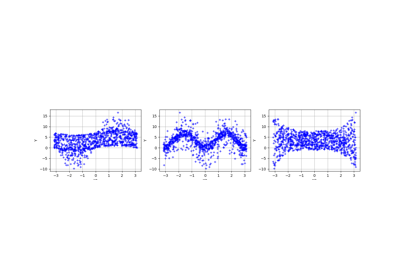
Create a polynomial chaos for the Ishigami function: a quick start guide to polynomial chaos
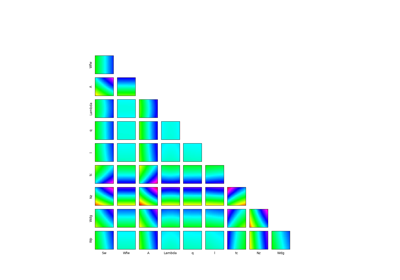
Example of sensitivity analyses on the wing weight model
 OpenTURNS
OpenTURNS

